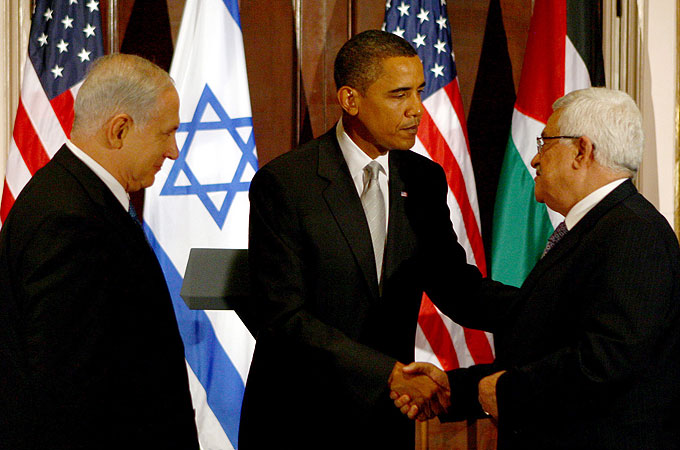Obama calls for settlement freeze
US president says moratorium on Israeli settlement construction should be extended beyond September 26 expiry date.

 |
| Obama, centre, said he had told Netanyahu, left, that it made ‘sense to extend the moratorium’ [EPA] |
Barack Obama, the US president, has called for Israel to extend its partial freeze of the building of settlements on occupied Palestinian land to inject fresh momentum into newly-resumed Middle East peace talks.
Speaking on Friday, Obama said that last week’s launch of a new round of peace talks between Israel and the Palestinians had “exceeded many people’s expectations”.
But the president warned that the approaching expiry of a moratorium on Israeli construction of projects on Palestinian territory, which is due to end on September 26, could threaten the negotiations.
“A major bone of contention during the course of this month is going to be the potential lapse of the settlement moratorium,” Obama told a White House news conference.
He said that he had told Binyamin Netanyahu, the Israeli prime minister, that “given so far the talks are moving forward in a constructive way, it makes sense to extend the moratorium”.
Obama also said he had spoken to Mahmoud Abbas, the president of the Palestinian Authority, and told him to “show the Israeli public that you are serious, and constructive in these talks so that the politics for prime minister Netanyahu, if he were to extend the settlement moratorium, would be a little bit easier”.
Al Jazeera’s Anand Naidoo, reporting from Washington, said that without the extension the talks could collapse.
“Palestinians have made it clear that they will walk away from these talks if the moratorium is lifted and settlement-building resumes, and that would be end of yet another attempt to achieve peace in the Middle East,” he said.
The second round of talks, which were launched at the beginning of the month in Washington after being broken off when Israel attacked the Gaza Strip in 2008, are due to talk place in Egypt and Israel next week.
Those attending will include Hillary Clinton, the US secretary of state.
Optimistic tone
Acknowledging that difficulties lay ahead, Obama struck a cautiously optimistic tone in Friday’s news conference.
“I remain hopeful but this is going to be tough,” Obama said, adding that Netanyahu and Abbas had come to the White House talks “with a sense of purpose and seriousness and cordiality that frankly exceeded lots of people’s expectations”.
However, he acknowledged that “there are enormous hurdles between now and our end point, and they’re going to be a whole bunch of folks in the region who want to undermine these negotiations”.
Both Israeli and Palestinian factions have cast doubt on the success of the talks.
Avigdor Lieberman, the Israeli foreign minister, has said that he does not expect peace talks to bear fruit and has ruled out any extension to the settlement freeze.
Meanwhile, Hamas, who hold power in the Gaza Strip and are also opposed to the talks, launched two attacks against settlers in the West Bank last week, killing four Israelis and wounding two others.
Obama said that he understood it was a “risk for us to promote” the new talks, but said “it’s a risk worth taking because the alternative is a status quo that is unsustainable”.
“If these talks break down, we’re going to keep on trying,” Obama said, adding that a peace deal in the Middle East would have long-term benefits for US interests in the region.
“It would help us deal with terrorist organisations in the region,” he said. “We’re not just doing this to feel good. We’re doing it because it will help secure America as well.”